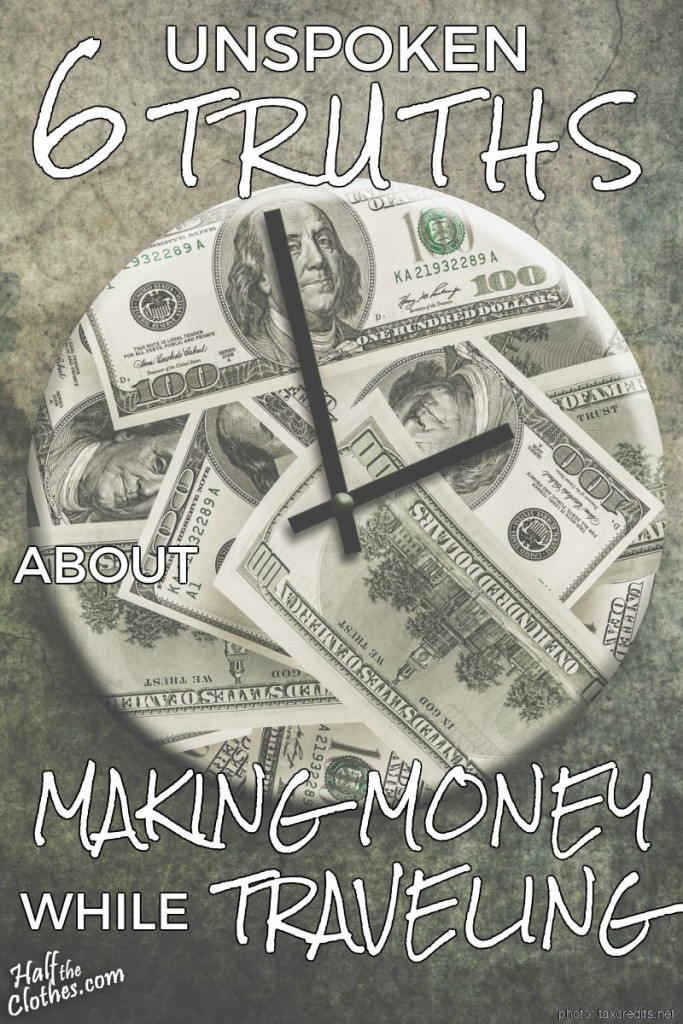I started to write a “How to Get a Job While Traveling the World” article for those wanting to make money while traveling, but I had to write this one first.
I connect with so many first-time travelers who drank the kool-aid — e.g. read all the bunnies-hearts-flowers 1or “constant flowers and ice cream sundaes” as Wandering Earl puts it travel blog posts about how easy it is to work and travel.
I don’t think anyone benefits from a sugar-coated reality, so I’m here to set the record straight. I hope it helps you get a realistic idea of what it’s really like to make money while traveling.
The aim of this article isn’t to discourage you.
If you want to work and travel, you can and you should!
My intention is to prepare you for battle.
Get ready to become a job-while-traveling warrior!
Let’s begin:
Is work easy? Most would say “no.” Work isn’t easy. Being committed to a schedule that you often don’t control and that fills most of your waking hours is what drives many people to travel in the first place.
Is travel easy? Oh helllllll no. Travel — especially budget travel — isn’t easy at all. Rewarding? God yes. The most rewarding thing I’ve ever done or I wouldn’t be still doing it after five six years. But it most certainly isn’t easy.
So if work isn’t easy and travel isn’t easy, how likely is it that combining them makes either one easy?
Exactly.

Both work and travel make it easy to end up exhausted. Combining working and traveling the world? It can be a double whammy! photo: Farrukh
So that’s the first thing no one tells you about making money while traveling:
1. Working and traveling is not easy.
The second thing no one tells you about getting a job while traveling the world:
2. You can’t work and travel.
You can either work, or you can travel. Think about it. You’re working now, aren’t you? How often do you go out and explore your town or city? How often do you leave your town/city? Once a month? It will be the same when you’re working another job, whether it’s in Istanbul or Shanghai or Berlin.

When you’re working, it’s easy for life to feel as chaotic as a packed beach. So, if you get a job while traveling the world – even if it’s at a packed beach – it will likely feel just as busy as working does at home. photo: Pedro Ribeiro Simões
Perhaps you plan to work part time so you’ll have a few exploring hours. However, once you find out how much effort it takes to get a job, you’re probably going to want to work as many hours as possible to rake in as much cash as possible, so you can avoid jumping through the job-getting hoops for as long as possible.
Which leads us to the third thing no one tells you about making money while traveling:
3. It’s not easy to get a job.
There are all these budget travel blog posts that say things like, “Oh, you just get a job as an au pair!” or “Oh, you just go teach English somewhere!” or “Pick fruit — it’s the best and everyone wants to hire you all the time!”
In many cases, travel bloggers saying this have not actually done the jobs. They’ve simply googled, “jobs while traveling” and curated a list of ideas. I sincerely hope I’m doing you a favor by bursting your bubble: there’s no free lunch.
Getting a job isn’t easy — whether you’re at home or abroad. The easier a job is to get, the less it pays, generally. I’ve worked a ton of awesome jobs in my life. At least 35, many simultaneously. 2Because I’m ridiculously keen to learn new things. I’m also just-plain ridiculous. I’ve had eight international jobs. Nine if you count being flown to Mexico from the U.S. to be a translator for a few weeks.
Six percent of the time, the employment fell into my lap with virtually no effort on my part. That means the other thirty-two times I did what anyone does to get a job — I networked, filled out applications, waited, went to interviews, waited more, got required licenses and certifications and drug tests, then waited more. All these things take time.

Getting a job while traveling the world can feel harder than climbing the ladder at your job back home. photo: wiwi15
Which leads me to thing #4 no one tells you about making money while traveling:
4. Working while traveling takes lots of time.
I know, I know. “Yeah, duh.” But hear me out.
It can take weeks to find a job. Yes, you can sometimes start working tomorrow, but, especially for jobs that pay well, the cost is time.
If you’re traveling around the world for a year, getting a job on the road to help fund your trip will eat up waaaaaay more time than you think.
How many months do you want to work out of those twelve? Two? Three? No matter how long you choose to work, you need to set aside at least two weeks to find said job. Sure, you could get lucky and job could just fall into your lap. But more likely you’ll have to do what everyone else does: network, wait, apply, wait, jump through hoops, wait, interview, and wait.
I’m not the only one experiencing the hurry-up-and-wait reality of the job world. Example #2 – a couple on an Australian working holiday spent five weeks – two in Cairns and three in Melbourne – looking for work! Here’s their story.

At least if the job-getting process requires you to wait around, you might get to do it in places like this! photo: Oliver & Hen Pritchard-Barrett
5. You might be better off just working at home and just traveling abroad.
If you can’t stand another day in the same old boring place paying the same old boring bills, if you just need to get the heck out of Dodge right this second, and that means that you’re going to run out of money and need to work abroad, that’s totally fine. Go for it! Carpe diem, baby!
If you don’t need the money (no bills to pay each month, enough cash to get around), if you don’t have the FOMO that propels most first-time travelers to rush around at break-neck pace, and if you just want to experience a culture in a daily-life sort of way, then you should absolutely get a job while traveling the world.
However, if you think the grass is greener on the other side, allow me to talk some sense into you.
Working in a place where you’re legal, understand the system, know the language, and have connections is way easier and more lucrative than making beds in a hostel in Mexico for $5 a day.

“Hmmm… it takes me an hour of cleaning garbage cans to make what I made in fifteen minutes doing data entry back home. Maybe it wasn’t so bad after all.” photo: Pedro Ribeiro Simões
Especially if you’ve got a professional job in your home country, my advice 99% of the time is to keep working at that job and save aggressively.
6. Jobs abroad can really suck.
You’re reading this article because you want to become a job-seeking immigrant. Think about this one. How do people in your country tend to feel about job-seeking immigrants? How easy is it for immigrants to get good, well-paying jobs in your country?
We can divide the foreign job possibilities for budget travelers into two categories: job in industrialized country, or job in developing country.
What can suck about working in an industrialized country?
- You don’t know the system — it’s easy for you to get screwed. Like this guy who had repeated misfortunes.
- You’re going to get the bottom-of-the-barrel jobs.
If you have a working holiday visa: think about why they give out those visas. Cheap labor from people who are pressed for time and young enough that they’ll take what they’re given.
If you don’t have a visa: industrialized countries have lots of red-tape in place to keep you from working. Namely: employer punishments. Sure, you might eventually find someone willing to pay you cash and flout the law. It will just take time to network and build the necessary trust. Or you’ll be working for a crazy person, which has its own challenges.
- You won’t get paid fairly. Immigrants aren’t usually taking anyone’s jobs. They’re doing the crappy work that doesn’t pay well enough for a country’s citizens to happily do it. 3Yes, arguably, if the immigrants weren’t there, the cheap-labor user would be forced to pay more for labor. But then guess who would bear those costs? The consumer. i.e. You. If you want to have your cheap fruit and eat it, too, you support immigrant labor. If you want to be paid a good wage to pick fruit, you also have to pay $5 a pound for it at the grocery store. Take this guy’s experience of Australia: in one of his many work debacles, he was being cheated out of $5 an hour — something only immigrants and students were putting up with.

Awww man, I didn’t know I was going to get treated like immigrants are treated in my country. This is sorta lame. photo: gratisography
What can suck about working in a developing country?
- You won’t generally get paid well — according to your standards. In places where it’s cheap for you to travel, wages tend to reference the local cost of living — also cheap in your view.
- You might not save much travel money. If you’re working in a developing country to earn money for onward travels, the cash flowing to your travel fund can be a very slow trickle. One woman teaching in Thailand explains after you’ve taken care of all basic needs, “With a little planning, you can even make small weekend trips. There won’t be much left over, but you shouldn’t be pinching pennies […]during the months there are classes.” A feisty blogger with the same background says, after fixed living costs “”¦that leaves you with [”¦] 700 baht a day [”¦] to put food in your stomach and clothes on your back.” You could save a good portion of your 700 baht (~$20 USD) if you live an austere life. It would be terribly easy to spend all of it: street food, plus a meal at a western restaurant and a drink at a bar and it’s gone!
- You might get paid better than your co-workers. Your paycheck might seem measly to you, but there are lots of places where foreigners doing the same job earn more than locals. Do you have a time in your life when you worked with someone who got paid more for the same job? How did you feel about that situation? And how did you feel about that person? Because if you end up in that situation, happily bankrolling your future travels, your co-workers might not be terribly enthusiastic about your good fortunes.
Alright — that’s it!
You are now armed and dangerous!
And completely ready to make an educated decision about whether getting a job while traveling the world is right for you. Check out:
24 Jobs To Do While Traveling the World
Did you change your mind about making money while traveling? Or do you feel more prepared to get a job while traveling the world? Tell us why or why not in the comments!
Happy Traveling! ♣
Want to delay the need to work? Check out:
- Free Flights
- How to Sleep for Free When You Travel
- How to Get a Free Backstage Cultural Pass
- Cheap Flight Hacks
- How to Become a House Sitter
Or get inspired: check out the play-by-play of one man’s twelve years of working and traveling.
References
| ↑1 | or “constant flowers and ice cream sundaes” as Wandering Earl puts it |
|---|---|
| ↑2 | Because I’m ridiculously keen to learn new things. I’m also just-plain ridiculous. |
| ↑3 | Yes, arguably, if the immigrants weren’t there, the cheap-labor user would be forced to pay more for labor. But then guess who would bear those costs? The consumer. i.e. You. If you want to have your cheap fruit and eat it, too, you support immigrant labor. If you want to be paid a good wage to pick fruit, you also have to pay $5 a pound for it at the grocery store. |





This is awesome .sometimes telling the truth is harder but for u its not.good luck with that
Thanks, Navgeeth! I think… 😉